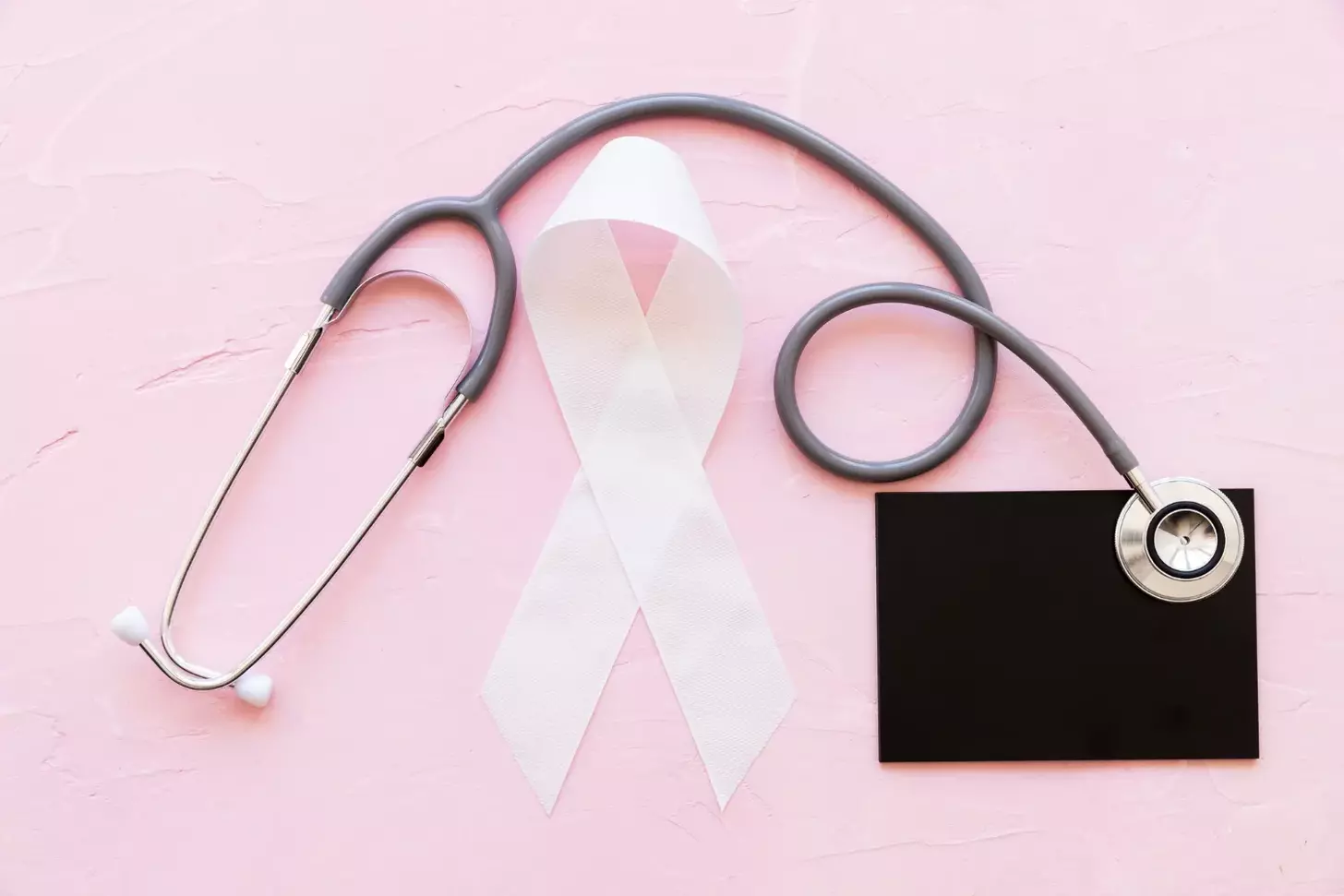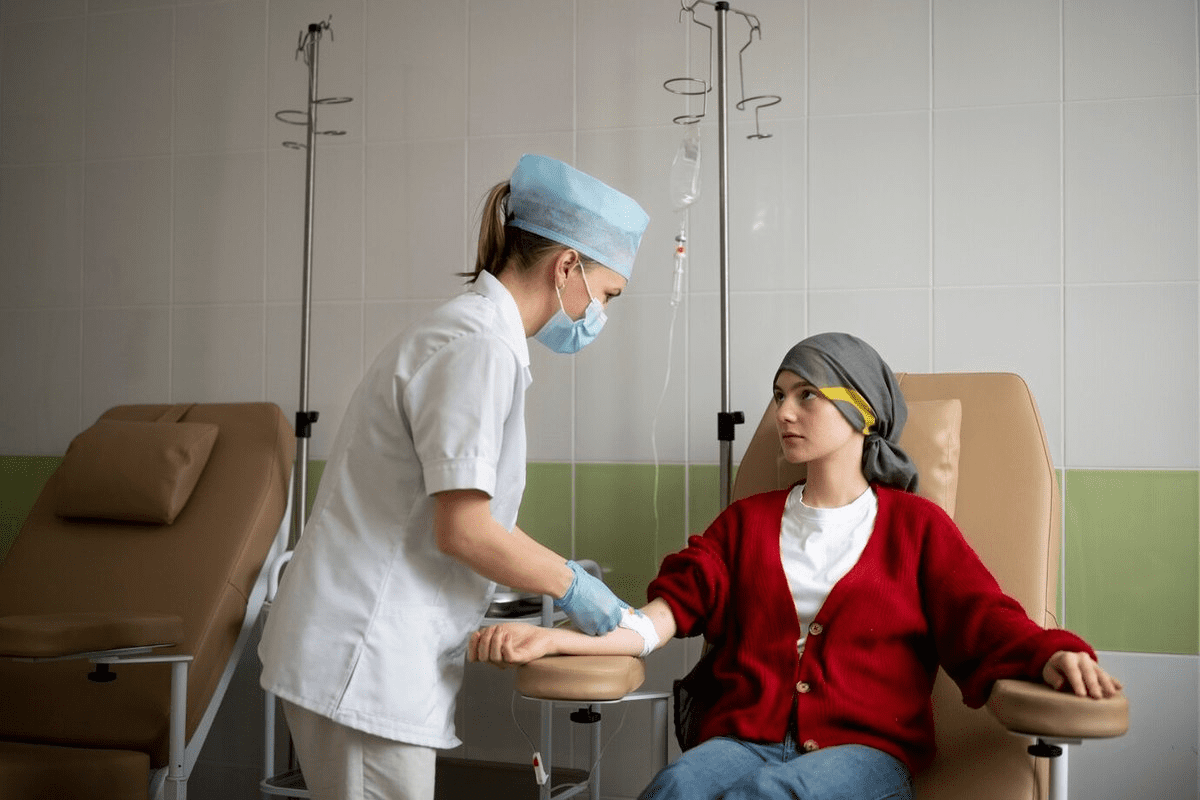Last Updated on November 27, 2025 by Bilal Hasdemir
What is the first red flag of colon cancer? Did you know that colon cancer is one of the most common types of cancer in the United States?
Recent studies show that the first warning sign often includes symptoms like rectal bleeding, abdominal pain, and changes in bowel habits.
It’s important to recognize these signs early. Knowing the colon cancer red flag can greatly improve treatment chances.
Key Takeaways
- Rectal bleeding is a common early symptom.
- Abdominal pain can be a sign of colon cancer.
- Changes in bowel habits should not be ignored.
- Early detection improves treatment outcomes.
- Awareness of colon cancer symptoms is key.

Understanding Colon Cancer
It’s important to know about colon cancer for early detection and treatment. Colon cancer is a big health issue in the U.S. It’s also becoming more common in younger adults.
What is Colon Cancer?
Definition and Prevalence in the United States
Colon cancer, also called colorectal cancer, is when abnormal cells grow out of control in the colon or rectum. The American Cancer Society says it’s one of the top cancers in the U.S. A lot of new cases happen every year.
Colon cancer starts from precancerous polyps in the colon or rectum. These polyps can turn cancerous if not taken out. Genetics, diet, and lifestyle play a role in getting colon cancer.
The Importance of Early Detection
Survival Rates by Stage
Finding colon cancer early greatly improves chances of survival. The American Cancer Society notes, “The five-year survival rate for colon cancer is 90% if caught early, compared to 14% if caught late.”
“Early detection is key to surviving colon cancer.”
Why Symptoms Are Often Overlooked
Symptoms of colon cancer are often mistaken for other less serious conditions. This can lead to a late diagnosis. It’s vital to know the signs and symptoms of colon cancer for quick medical help.
The Primary Colon Cancer Red Flag: Rectal Bleeding
Rectal bleeding is a key warning sign for colon cancer. It’s important not to ignore it. This symptom means blood is coming out through the anus, possibly from the colon or rectum. Knowing why rectal bleeding happens is key to finding and treating colon cancer early.
Why Bleeding Occurs in Colon Cancer
Bleeding in colon cancer happens because tumors grow in the colon or rectum. These tumors can damage the tissue around them, causing blood to leak out.
Tumor-Related Bleeding Mechanisms
Tumors can bleed for a few reasons. As they grow, they might outgrow their blood supply, leading to tissue death and bleeding. They can also directly damage nearby blood vessels, causing them to burst.
Visible vs. Occult Blood
Stool can have visible or hidden blood. Visible blood is easy to see, while hidden blood needs a lab test to find. Both kinds of bleeding need to be checked out.
Identifying Blood in Stool
Spotting blood in stool is important for catching colon cancer. Blood can change the color of your stool.
Color Changes and What They Mean
The color of stool blood can tell you where the bleeding is coming from. Bright red blood usually means the bleeding is from the lower colon or rectum. Darker blood might mean the bleeding is higher up in the colon or even in the small intestine.
When to Seek Immediate Medical Attention
If you have heavy bleeding, pain in your belly, or other symptoms with rectal bleeding, get help right away. Quick action is key to figuring out why you’re bleeding and starting the right treatment.
Distinguishing from Hemorrhoids and Other Causes
Rectal bleeding is often thought to be from hemorrhoids, but it could also be from colon cancer. It’s important to tell the difference. While hemorrhoids are common, colon cancer can also cause similar symptoms.
“The presence of blood in stool should always be taken seriously and investigated further to rule out colon cancer or other serious conditions.”
To find out why you’re bleeding, you need a detailed medical check-up. This might include tests like a colonoscopy.
| Cause of Rectal Bleeding | Common Symptoms | Diagnostic Approach |
| Hemorrhoids | Painful swelling, itching | Physical examination, anoscopy |
| Colon Cancer | Blood in stool, changes in bowel habits | Colonoscopy, biopsy |
| Inflammatory Bowel Disease | Diarrhea, abdominal pain | Endoscopy, imaging studies |
Changes in Bowel Habits as Warning Signs
Changes in bowel habits can signal colon cancer. Look out for persistent diarrhea, constipation, narrowing of stool, and alternating between diarrhea and constipation.
Persistent Diarrhea
Diarrhea lasting more than a few days might be a sign of colon cancer. Duration is key; seek medical help if it goes on for weeks.
Duration That Signals Concern
Diarrhea that lasts over 3-4 weeks needs checking. Look for other signs like blood in stool too.
Associated Symptoms
Abdominal pain, weight loss, and fatigue with diarrhea could mean colon cancer.
Unexplained Constipation
New constipation that doesn’t go away could be a warning. It’s important to tell if it’s caused by a tumor.
When New Constipation Warrants Investigation
Constipation with other symptoms like rectal bleeding or new in someone without history needs a doctor’s check.
Narrowing of Stool
Narrowing of stool can be a tumor sign. This is a big warning sign.
Why Tumors Cause Stool Narrowing
Tumors can block the colon, making stool thin. This is often seen as pencil-thin stools.
Alternating Diarrhea and Constipation
Switching between diarrhea and constipation might mean a tumor. This irregular bowel habit is a big warning.
Spotting these bowel habit changes is key for early colon cancer detection. If you notice these symptoms, see a doctor.
Abdominal Discomfort and Pain
Don’t ignore persistent abdominal discomfort. It might be a sign of colon cancer. People with colon cancer often feel pain and discomfort in their abdomen. This pain can take many forms and vary in intensity.
Types of Pain Associated with Colon Cancer
Colon cancer can cause different kinds of abdominal pain. These pains can be in one spot or spread out across the belly.
Location and Characteristics
The pain from colon cancer can be felt in different parts of the abdomen. It might stay in one area or cover the whole belly. The pain can feel like a dull ache or sharp stabbing.
Persistent vs. Intermittent Pain
Pain from colon cancer can either stay the same or come and go. But, pain that lasts is more likely to be from colon cancer.
Distinguishing from Common Digestive Issues
Abdominal pain can have many causes, making it hard to tell if it’s from colon cancer just by the pain. But, some signs might mean you need to see a doctor.
When IBS-Like Symptoms Need Further Investigation
Symptoms like those from Irritable Bowel Syndrome (IBS) can sometimes mean colon cancer. If these symptoms don’t go away or are with other warning signs, you should get checked by a doctor.
Cramps, Bloating, and Gas
Cramps, bloating, and gas are also symptoms that can be linked to colon cancer.
Why These Symptoms Occur
These symptoms happen because of the tumor in the colon. It can block the normal flow of food, causing cramps, bloating, and gas.
| Symptom | Characteristics | Possible Indication |
| Abdominal Pain | Can be persistent or intermittent, varying in intensity | Colon Cancer |
| Cramps | Often associated with bowel movements or gas | Intestinal Obstruction |
| Bloating and Gas | Can be persistent, causing discomfort | Colon Obstruction or Tumor |
Unexplained Weight Loss and Fatigue
The start of unexplained weight loss and fatigue is a big worry. These signs can hint at colon cancer. Even though they might not seem specific, their lasting presence and intensity can point to a serious issue.
Cancer-Related Weight Loss
Weight loss in colon cancer happens because of changes in how the body uses energy. Cancer cells change how nutrients are used, causing weight loss even when hunger stays the same.
How Much Weight Loss Is Concerning
More than 5% of body weight lost over 6-12 months is a red flag. It’s time to see a doctor to find out why.
Metabolic Changes in Cancer
Cancer changes how the body uses nutrients. This can cause cachexia, a condition with weight loss, muscle loss, and tiredness.
Fatigue and Weakness
Fatigue is a common symptom in colon cancer. It’s a deep, lasting tiredness that doesn’t get better with rest. This symptom can really lower a person’s quality of life.
Distinguishing Cancer Fatigue from Normal Tiredness
Cancer fatigue is much worse and lasts longer than regular tiredness. It makes it hard to do daily tasks and doesn’t get better with rest or sleep.
The Connection to Anemia
Anemia, often from iron deficiency due to blood loss from the tumor, is common in colon cancer. It causes fatigue, weakness, and shortness of breath, making things even harder.
In summary, unexplained weight loss and fatigue are key symptoms that might mean colon cancer. Knowing about these signs and how they relate to anemia and metabolic changes is key for early detection and treatment.
Iron Deficiency Anemia as a Colon Cancer Red Flag
Iron deficiency anemia is a sign of colon cancer that’s often missed. It happens when the body doesn’t have enough iron to make hemoglobin. Hemoglobin is a protein in red blood cells that carries oxygen.
How Colon Cancer Leads to Anemia
Colon cancer can cause anemia by losing blood slowly. Tumors in the colon can bleed, leading to a gradual loss of blood over time.
Recognizing Anemia Symptoms
It’s important to know the symptoms of anemia early. Common signs include feeling tired, weak, and short of breath.
Diagnostic Tests for Iron Deficiency
Tests are key to finding iron deficiency anemia. Blood tests are the main way to diagnose this condition.
Blood Tests and Interpretation
Blood tests check hemoglobin levels, mean corpuscular volume (MCV), and iron levels. A diagnosis of iron deficiency anemia is made when these levels are low.
| Parameter | Normal Range | Iron Deficiency Anemia |
| Hemoglobin (g/dL) | 13.5-17.5 (male), 12-16 (female) | Below normal range |
| MCV (fL) | 80-100 | Below 80 |
| Iron ( µg/dL) | 60-170 | Below 60 |
Less Common Early Warning Signs
Rectal bleeding and changes in bowel habits are known signs of colon cancer. But, there are other symptoms that are less common but just as important. Recognizing these signs early can help in catching and treating the disease sooner.
Tenesmus (Feeling of Incomplete Evacuation)
Tenesmus is when you feel like your bowel isn’t fully emptying. You might feel a strong urge to pass stools. This symptom is often linked to rectal tumors.
Why This Occurs in Rectal Tumors
In rectal tumors, tenesmus happens because the tumor blocks part of the rectum. This makes you feel like you’re not fully emptying your bowel.
Early Bowel Obstruction Symptoms
Bowel obstruction is a serious problem that can happen with colon cancer. Early signs include feeling like your abdomen is swelling up and down.
Intermittent Abdominal Distension
This symptom is when your abdomen swells up and down. It’s due to gas or intestinal contents building up. It’s a sign that you might have an impending bowel obstruction.
Unexplained Fever and Night Sweats
Feeling feverish or sweating a lot at night without reason can mean advanced colon cancer or metastasis. These symptoms happen because your body is fighting off the cancer.
Stool Color Changes Beyond Blood
Stool that’s pale or clay-colored can mean problems with the bile duct. Sometimes, this is linked to colon cancer.
| Symptom | Description | Possible Cause |
| Tenesmus | Sensation of incomplete bowel emptying | Rectal tumor |
| Intermittent Abdominal Distension | Periodic swelling of the abdomen | Early bowel obstruction |
| Unexplained Fever and Night Sweats | Fever and sweating at night without clear cause | Advanced colon cancer or metastasis |
| Stool Color Changes | Pale or clay-colored stools | Bile duct obstruction |
Knowing about these less common symptoms is key to catching colon cancer early. If you or someone you know is showing any of these signs, it’s important to see a doctor right away.
Diagnostic Delays: Why Red Flags Are Missed
Delays in diagnosing colon cancer come from both patient and healthcare system issues. Knowing these reasons is key to catching cancer early and treating it better.
Patient-Related Factors
Patients play a role in delays by how they act and think. Two main reasons are normalizing symptoms and feeling too shy to talk about them.
Symptom Normalization and Denial
Many people think early colon cancer symptoms are just minor issues. They might ignore changes in bowel habits or stomach pain, leading to late doctor visits.
Embarrassment About Discussing Symptoms
Feeling too embarrassed is another big reason patients don’t talk about their symptoms. This feeling comes from the private nature of these issues.
Healthcare System Factors
The healthcare system also causes delays. Misreading symptoms and making it hard to get screened are big problems.
Misdiagnosis of Early Symptoms
Doctors might think early colon cancer symptoms are something else, like hemorrhoids or IBS. This mistake can cause a delay in finding the real problem.
Access to Screening Barriers
Getting screened is hard for some. Issues like no insurance, high deductibles, or not having a doctor nearby stop people from getting checked early.
The Impact of Delayed Diagnosis
When diagnosis is late, colon cancer can get worse. This is one of the biggest problems.
Stage Progression During Delays
As time goes by, colon cancer can move from an early to a later stage. This makes treatment harder and can lower chances of survival.
Early detection is key to better outcomes in colon cancer. We need to tackle both patient and healthcare system issues to cut down on delays.
Conclusion
It’s important to know the signs of colon cancer early. This can lead to better treatment and survival chances. We’ve talked about key warning signs like rectal bleeding and changes in bowel habits.
Spotting these signs early and getting medical help fast is critical. It can greatly improve treatment options for colon cancer patients. Early detection is the best way to fight this disease.
Knowing the risk factors and symptoms of colon cancer helps people take care of their health. Regular health checks and screenings are key to catching colon cancer early.
Being informed and watching your health closely can help fight colon cancer. Focusing on early detection can save lives and improve life quality for those with the disease.
FAQ
What are the early warning signs of colon cancer?
Early signs of colon cancer include rectal bleeding and changes in bowel habits. You might also feel abdominal pain, unexplained weight loss, and fatigue. Iron deficiency anemia and less common symptoms like tenesmus and changes in stool color are also signs.
Is rectal bleeding always a sign of colon cancer?
No, rectal bleeding isn’t always from colon cancer. It can also be from hemorrhoids or anal fissures. But, if bleeding is persistent or severe, you should see a doctor.
What changes in bowel habits could indicate colon cancer?
Changes that might mean colon cancer include persistent diarrhea or constipation. You might also notice narrowing of stool or alternating between diarrhea and constipation.
How does colon cancer cause abdominal pain?
Colon cancer can cause pain by blocking the bowel or invading tissues. This pain can be crampy, persistent, or severe.
What is the connection between colon cancer and iron deficiency anemia?
Colon cancer can lead to iron deficiency anemia through chronic blood loss. This loss depletes iron stores, causing fatigue, weakness, and shortness of breath.
Can colon cancer cause unexplained weight loss and fatigue?
Yes, colon cancer can cause unexplained weight loss and fatigue. Cancer cells can change metabolism, leading to weight loss. Anemia, caused by chronic blood loss, can also cause fatigue.
What is tenesmus, and is it related to colon cancer?
Tenesmus is a feeling of incomplete evacuation or a persistent urge to have a bowel movement. It can be a symptom of colon cancer, but only if other red flags are present.
How can diagnostic delays occur in colon cancer?
Delays in diagnosing colon cancer can happen due to patient-related factors like symptom normalization and embarrassment. Healthcare system factors like misdiagnosis and barriers to screening also play a role.
Why is early detection of colon cancer important?
Early detection of colon cancer is key because it improves treatment outcomes and survival rates. When caught early, colon cancer is more treatable, and survival chances are higher.
What should I do if I’m experiencing colon cancer red flags?
If you’re experiencing colon cancer red flags, see a healthcare professional right away. They will check your symptoms, do diagnostic tests, and guide you on what to do next.






